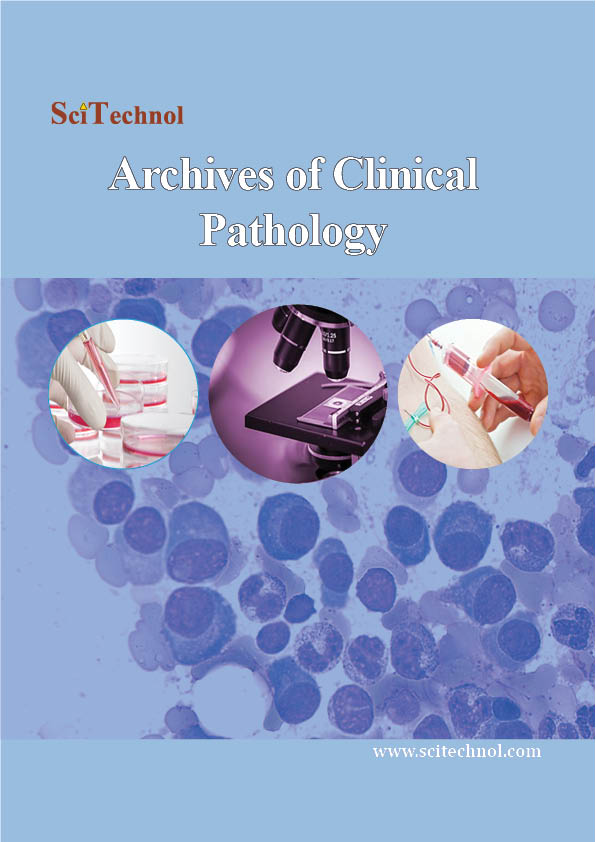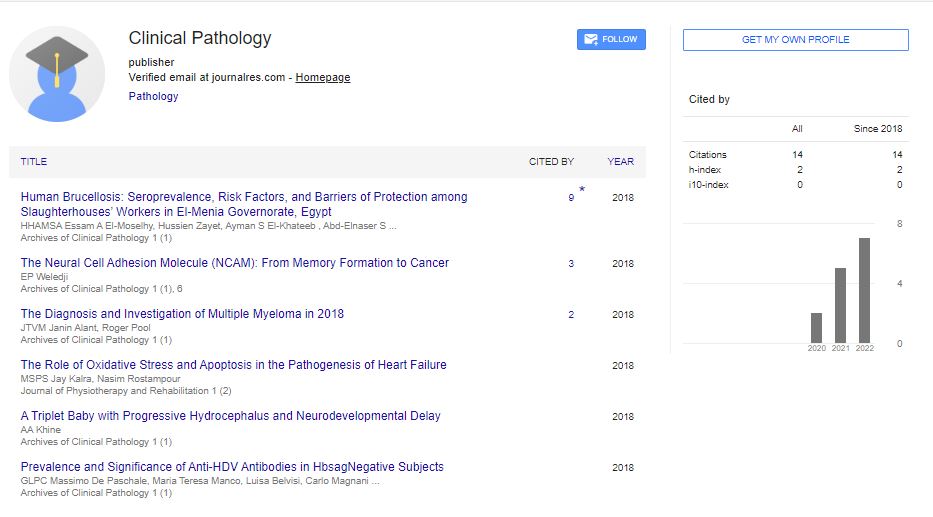About the Archives of Clinical Pathology

Archives of Clinical Pathology is an international peer reviewed open access journal introduced to research world with an aim to serve the scientific community in the studies of basic, clinical and translational research in pathology that encompasses diagnosis, prevention and treatment of diseases. The Journal intends to promote all the aspects of Clinical Pathology Studies concerning etiology, pathogenesis, diagnosis of disease, clinical trials, and medical laboratory analysis; and cater to the needs of clinical professionals, physicians, researchers, scientists and Pharmacists.
The Journal covers diagnostic and research areas of all the divisions of Pathology which includes:
- Anatomical Pathology
- Histopathology
- Clinical Virology
- Haematology
- Clinical Microbiology
- Cytopathology
- Molecular Pathology
- Dermatopathology
- Neuropathology
- Surgical Pathology
- Diagnostic Immunology
- Immunopathology
- Pathology techniques and medical methods used for pathological analysis, disease diagnosis and cure
The journals main mission lies in providing rapid publication of papers in the form of original research article, review article, short communication, case report, letter-to-the-Editor and Editorials for publication in an open access platform.
The Editorial Manager System helps in maintaining the quality of the peer review process and provides easy access to the authors to track the status of the manuscript, including evaluation and publication in an automated way. Subject experts under the supervision of the Editor-in-Chief review the manuscripts. Approval of at least two independent reviewers and the editor is mandatory for the acceptance of the manuscript for publication..
Anatomical Pathology
Studies of the morphologic aspects of disease along with subspecialties which can be align towards specific organ system, different laboratory methods and some clinical cases. gastrointestinal pathology; gynecological pathology; cardiovascular pathology; dermatopathology; respiratory pathology; musculoskeletal pathology; renal pathology, genito-urinary pathology; endocrine pathology; ophthalmic pathology; E.N.T. pathology; and neuropathology are the specific organ systems which is studied in anatomical pathology.
Clinical Pathology
Clinical pathology is also known as laboratory medicine. Diagnosis of disease based on the laboratory analysis of bodily fluids, such as blood, urine, and tissue homogenates or extracts using the tools of chemistry, microbiology, hematology and molecular pathology is known as clinical pathology. Clinical pathology is one of the major divisions of pathology. There are some subspecialties of clinical pathology which includes clinical chemistry, clinical hematology/blood banking, hematopathology and clinical microbiology.
Clinical Chemistry
Clinical chemistry mainly concerned with clinical analyses of biological materials and body fluids for diagnostic and therapeutic monitoring. It includes all biochemical tests. This branch of study comprises analysis of body fluids, tissues and Cells. These tests are again categorised into sub-specialities which generally includes Special chemistry, Clinical endocrinology, Toxicology, General or routine chemistry, Therapeutic Drug Monitoring, Urinalysis, Fecal analysis. Some common clinical chemistry tests includes: Electrolytes, Renal Function Tests, Minerals, Cardiac Markers, Blood Disorders, Liver Function Tests.
Clinical Virology
Clinical Virology is a branch of medicine which focuses on detecting different types of viruses responsible for some particular human pathology with the help of different direct or indirect techniques. It also consists in proving the absence of resistance of viruses in treatment antiviral by viral genome sequencing to adapt antiviral therapeutics at best.
Medical Microbiology
Medical microbiology is a branch of medical science concerned with the treatment, prevention and diagnosis of infectious diseases. This branch is mainly involved in the study of various clinical applications of microbes for better health. The four major kinds of microorganisms that are involved in causing infectious diseases are bacteria, fungi, parasites and viruses. This study mainly helps in identification of bacterial and viral morphologies and to understand their characteristic in culture media. It deals with diagnosis and management of infections of both human and animal and the elucidation of the epidemiology of infectious diseases. This branch mainly studies the modes of transmission, mechanisms of cause of infection and their growth. Microbes are also helpful in prevent or cure the infectious disease thereby promoting the good health.
Reproductive Biology
Reproductive biology consists of both sexual and asexual reproduction. The fields coming under reproductive biology are: Reproductive systems, Endocrinology, Sexual development, Sexual maturity, Reproduction, Fertility.
Hematopathology
A branch of pathology which studies hematopoietic cells diseases is called hematopathology. Hematopoietic system consists of tissues and organs which produce and mainly host hematopoietic cells. It includes bone marrow, the lymph nodes, thymus, spleen, and other lymphoid tissues.
Dermatopathology
Dermatopathology is a subspecialty of pathology that deals with causes of structural and compositional changes occur in skin disease. It also encompasses analyses of the possible causes of skin disorders at their basic level.
Surgical Pathology
Surgical pathology is the branch of pathology which is used to study the tissue removed from living patients while surgery to help in deciding treatment plan to diagnose that particular disease. Surgical pathology includes examination of tissue with naked eye as well as with the help of microscope. There are two main types of surgical pathology specimens include: Biopsies and Surgical resection.
Immunopathology
Immunopathology is a branch of medicine with studies the pathology of an organism, organ system, disease related to immune system, immunity and immune response. In biology, it refers to damage caused to an organism by its own immune response, as a result of an infection. It can be result of mismatch between pathogen and host species, and it usually takes place when a human is getting affected from animal pathogen.
Molecular Pathology
Molecular pathology is a discipline of pathology which focuses on study and diagnosis of disease with the help of examination of molecules within organs and tissues. Molecular pathology shares some characteristics of practice with two sub classification of pathology, i.e.: Anatomic pathology and Clinical pathology. Molecular pathology mainly focuses on sub-microscopic aspects of disease ad also develops molecular and genetic applications for diagnosis of disease.
Cytopathology
Cytopathology is a branch of pathology which deals with the study of individual or free cells or tissue fragments in the disease which is extracted from tissues. Diagnostic techniques are used, which examines cells from various sites of the body which finally determines the exact cause or the nature of disease. In other words Cytopathology is the study of individual cells in disease. In contrast whole tissues are examined in the histopathology. Cytopathology is generally used to investigate diseases involving a wide range of body sites, often to aid in the diagnosis of cancer, but also in the diagnosis of some infectious diseases and other inflammatory conditions. For cytopathologic analysis, there are two methods for collecting cells: Exfoliative cytology method and Intervention cytology method.
Transfusion Medicine
Transfusion Medicine is clinical specialty branch that mainly concerned with blood transfusion and blood components. It includes blood donation, immunohematology and other testing in laboratory, transfusion practices, therapeutic apheresis, stem cell collections, cellular therapy, and coagulation. Transfusion is a part of treatment in medicine. It is generally used in Hematology/Oncology and in other specialties like surgery. Many tests are performed in the laboratory like Blood type, blood compatibility test, antibodies investigation. Anticoagulant solutions, Preservation of solutions, Component administration, Infectious disease testing, Blood Banks, High-risk donor screening all these comes under this branch of medicine. In blood donor center handles collects and processing blood products.
Cytogenetics
Cytogenetics is a branch of genetics which analyses the chromosomes behavior to cell. Particularly it analyses chromosomes behavior during mitosis and meiosis. It includes different types of techniques like karyotyping, analysis of G-banded chromosomes, other cytogenetic banding techniques, as well as molecular cytogenetics such as fluorescent in situ hybridization (FISH) and comparative genomic hybridization (CGH) to analyses cell behavior. Changes in the number and structure of the chromosomes can lead problems with the growth, development and functions of body. Chromosomal abnormalities can take place during early fetal development or when egg and sperm cells are being made.
Forensic Pathology
Forensic pathology is and application of medical jurisprudence used for discovering the cause of death mainly for sudden death and if the death is suspected not natural by police. In other words deaths having known cause and suspected unnatural are investigated in forensic pathology. A post mortem is performed by a physician, typically throughout the investigation of legal code cases and civil law cases in some jurisdictions.
Histopathology
To study the manifestations of disease, microscopic examinations of tissue is done which is known as Histopathology. In clinical medicine, after processing the specimen along with placing the histological sections on glass slides, examination of a surgical specimen is done by a pathologist that is known as histopathology.Combination of hematoxylin and eosin is the most commonly used stain in histopathology. Nuclei blue is stained by Hematoxylin, while stains cytoplasm and the extracellular connective tissue matrix pink is stained by eosin.
Neuropathology
Neuropathology is a subspecialty of anatomic pathology, neurology and neurosurgery which studies the diseases of the nervous system tissue, mainly in the form of either small surgical biopsies or whole-body autopsies. It mainly includes tissue samples laboratory analysis for forensic investigations. Neuropathologist main work in autopsy is to help in post-mortem diagnosis of various forms of dementia and other conditions that affect the central nervous system. Mainly neuropathologist examines biopsy tissue from the brain and spinal cord to aid in diagnosis of disease.
Experimental Pathology
Experimental pathology is the medical field of pathology which studies processes of disease with the help of microscopic or molecular examination of organs, cells, tissues or body fluids from diseases organism.
Diagnostic Immunology
A variety of diagnostic technique which depends upon the specificity of the antigen antibody bond is known as Diagnostic Immunology. Diagnostic Immunology is mainly used for the observation of smallest amount of biochemical substances. Particular antibody for an antigen can be conjugated with a radiolabel, fluorescent label, or color-forming enzyme and are used as a "probe" to detect it.
Molecular Diagnostic and Toxicology
A collection of methods used for the analyses of biological markers in the genome and proteome-the individual's genetic code and how their cells express their genes as proteins-by applying molecular biology to medical testing is known as molecular diagnostic. This method is used for the diagnosis and monitoring of disease by detecting the risk of disease and deciding the best therapy for the treatment of patient. Molecular toxicology is the study of effects of different and chemical components on living organisms.
Fast Editorial Execution and Review Process (FEE-Review Process):
Archives of Clinical Pathology is participating in the Fast Editorial Execution and Review Process (FEE-Review Process) with an additional prepayment of $99 apart from the regular article processing fee. Fast Editorial Execution and Review Process is a special service for the article that enables it to get a faster response in the pre-review stage from the handling editor as well as a review from the reviewer. An author can get a faster response of pre-review maximum in 3 days since submission, and a review process by the reviewer maximum in 5 days, followed by revision/publication in 2 days. If the article gets notified for revision by the handling editor, then it will take another 5 days for external review by the previous reviewer or alternative reviewer.
Acceptance of manuscripts is driven entirely by handling editorial team considerations and independent peer-review, ensuring the highest standards are maintained no matter the route to regular peer-reviewed publication or a fast editorial review process. The handling editor and the article contributor are responsible for adhering to scientific standards. The article FEE-Review process of $99 will not be refunded even if the article is rejected or withdrawn for publication.
The corresponding author or institution/organization is responsible for making the manuscript FEE-Review Process payment. The additional FEE-Review Process payment covers the fast review processing and quick editorial decisions, and regular article publication covers the preparation in various formats for online publication, securing full-text inclusion in a number of permanent archives like HTML, XML, and PDF, and feeding to different indexing agencies.
 Spanish
Spanish  Chinese
Chinese  Russian
Russian  German
German  French
French  Japanese
Japanese  Portuguese
Portuguese  Hindi
Hindi 
